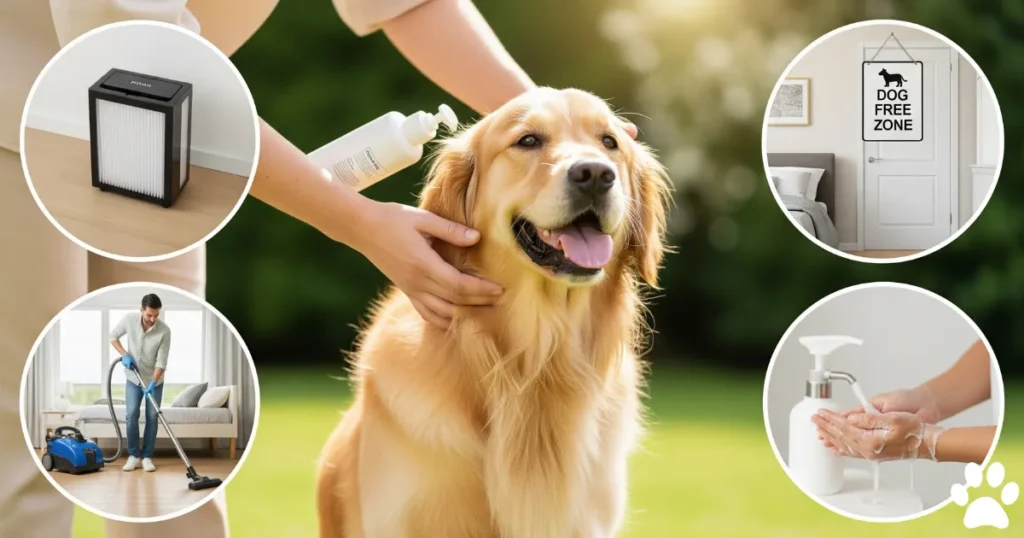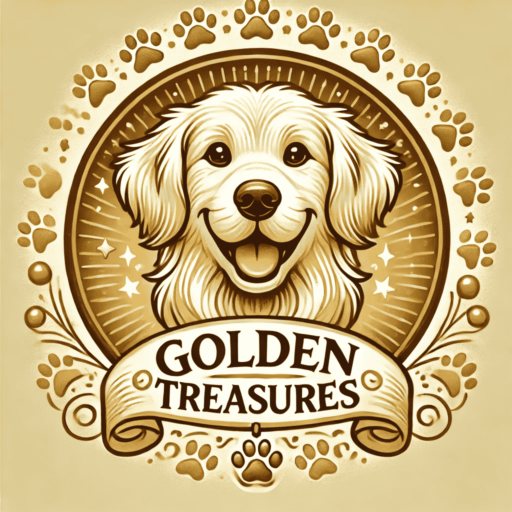Golden retrievers are one of the most beloved and popular dog breeds in the world. They are most friendly, affectionate, intelligent, and great family dogs. However, for allergy sufferers, this raises an important question: are golden retrievers hypoallergenic? The short answer is no, golden retrievers are not hypoallergenic. Some dog breeds generate less allergies, like dander, saliva proteins, or hair loss, but no breed is totally free of allergens. Sadly, they do not include golden retrievers. They are frequently a bad option for allergy patients because to their thick, double coat and rapid shedding rate.
However, this doesn’t mean you can’t live with a golden retriever if you have allergies. Understanding what causes allergic reactions in people, how golden retrievers contribute to them, and how you can reduce your exposure can be crucial. In this blog, you will learn everything you need to know about the question, “Are Golden Retrievers Hypoallergenic?” We will look at what the term actually means, why Golden Retrievers are not on the list of hypoallergenic dogs, and how to minimize allergic reactions if you already have a dog or are considering getting one.
Contents
- 1 What does “hypoallergenic” actually mean for dogs?
- 2 Are Golden Retrievers Hypoallergenic? Here’s the Honest Answer
- 2.1 Dander, Saliva, and Flakes Explained
- 2.2 Why Do Golden Retrievers Cause Allergies in People?
- 2.3 What makes a dog more or less allergenic?
- 2.4 Low-Shedding and High-Shedding Breeds
- 2.5 Hair, Saliva, and Grooming
- 2.6 Can I Get a Golden Retriever If I Have Allergies?
- 2.7 Factors to Consider Before Getting a Pet
- 2.8 Allergy Sufferers and Golden Retrievers Reviews
- 2.9 Lifestyle Changes for Allergy Sufferers
- 2.10 Do Golden Retrievers Have Allergies?
- 2.11 Common Symptoms of Allergies in Golden Retrievers
- 2.12 Diagnosis and Treatment
- 3 Signs of Allergies in Golden Retrievers You Shouldn’t Ignore
- 4 How to Reduce Allergic Reactions to a Golden Retriever
- 5 Tips for Managing Allergies in Golden Retrievers
- 6 Final Thoughts: Are Golden Retrievers Hypoallergenic Enough for You?
What does “hypoallergenic” actually mean for dogs?
Before answering the question “Are Golden Retrievers hypoallergenic?” it’s important to understand what “hypoallergenic” actually means for dogs. This term is often misunderstood, causing many pet lovers to believe that certain dog breeds are completely safe for allergy sufferers. Actually, this isn’t quite accurate.
Understanding Hypoallergenic Dog Breeds
A hypoallergenic dog breed is less likely to cause allergic reactions in people. These dogs typically shed less, produce less protein in their saliva, or have a coat that holds fewer allergens. Breeds like Poodles, Bichon Frises, and Portuguese Water Dogs are often described as hypoallergenic – not because they are allergen-free, but because they release fewer allergens into the environment. In this instance, are golden retrievers hypoallergenic? Unfortunately, no. They have a thick, double coat that sheds heavily and constantly, making them unsuitable for allergy sufferers.
Protein Allergens for Dandruff and Hair Loss
Most people think dog hair causes allergies, however this is a misconception. The real cause of allergic reactions is the protein found in a dog’s saliva, urine, and fur. During grooming, these proteins stick to the dander and are released into the air when the dog sheds. Compared to hypoallergenic breeds, Golden Retrievers disperse these proteins throughout the house more because they shed so much. Because of the quantity of allergenic proteins they sweat, the answer to the question, “Are Golden Retrievers hypoallergenic?” is a loud negative.

Are Golden Retrievers Hypoallergenic? Here’s the Honest Answer
Let’s get right to the heart of the matter: Are Golden Retrievers Hypoallergenic? The honest answer is no, they are not. While they are sweet, loyal, and family-friendly, Golden Retrievers are unfortunately not a good choice for people with moderate to severe dog allergies. They have a thick, double coat that collects a lot of dust and pollen, they shed all year, and they generate a lot of dander. These characteristics make them one of the most susceptible breeds to allergies—not just to people, but also because of their own sensitivities. Allergies in Golden Retrievers are common and affect both their health and the well-being of their owners.
Dander, Saliva, and Flakes Explained
The allergens that cause reactions in people don’t come from the dog’s fur, but from proteins in the dog’s saliva, urine, and dander. When your Golden Retriever grooms itself, these proteins stick to its fur. When your Golden Retriever sheds (which happens often), these allergens become airborne and spread throughout your home. Golden Retrievers are heavy shedders. They shed seasonally, but their fur is shed year-round. Because they shed constantly, the proteins that cause allergens are constantly present, making it difficult for allergy sufferers to find relief.
Why Do Golden Retrievers Cause Allergies in People?
Golden Retrievers are affectionate dogs that love to cuddle, lick, and be close to their owners. Unfortunately, this affectionate behavior also increases their exposure to allergens. Their size means more dander, more drool, and more shedding than smaller breeds. Are Golden Retrievers hypoallergenic? Of course not, but that doesn’t mean allergy sufferers can’t enjoy life with them. With the right precautions, you can keep symptoms under control and still share your home with this beautiful breed.
What makes a dog more or less allergenic?
To understand why certain dog breeds are better for people with allergies, it’s helpful to learn what makes a dog more or less allergenic. It’s not how much a dog sheds, but what it sheds, how often, and how it releases allergens like dander and saliva. While many pet owners want a furry friend that doesn’t make them sneeze or scratch, no breed is completely allergen-free. Which brings us back to the frequently asked question: Are Golden Retrievers hypoallergenic? The answer is no, mainly because of the characteristics listed below.
Low-Shedding and High-Shedding Breeds
Dogs that shed very little, like Poodles or Schnauzers, tend to retain more dander and release fewer allergens into the air. Many high-shedding breeds, such as Golden Retrievers, shed constantly in the home. This increases the buildup of allergens on carpets, furniture, and air filters.
Hair, Saliva, and Grooming
The majority of dog allergies are mostly brought on by hair, or tiny furry strands. Some breeds shed less or shed more slowly. Dogs that drool more or groom themselves excessively, such as Golden Retrievers, also shed more allergenic proteins. While proper grooming can reduce shedding, Golden Retrievers require regular grooming to prevent allergens from building up. So if you’re wondering, “Are Golden Retrievers hypoallergenic?” the answer lies in their natural tendency to shed allergens through hair, saliva, and excessive shedding.
Can I Get a Golden Retriever If I Have Allergies?
Many dog owners ask, “Are Golden Retrievers Hypoallergenic?” — Particularly if they have a family history of allergies. While Golden Retrievers are not hypoallergenic by definition, with the right knowledge, training, and dedication, they can be adopted. Let’s look at the most important factors to consider before deciding if a Golden Retriever is right for you.
Factors to Consider Before Getting a Pet
If you or someone in your family suffers from pet allergies, it’s important to understand your own sensitivities. Mild colds are usually easy to treat, but if you have more serious dog allergy signs, such as wheezing, asthma attacks, or severe skin reactions, living with a Golden Retriever may require drastic lifestyle changes. Also, be aware of your surroundings. Wood floors, HEPA filters, and pet-free areas can reduce exposure. A clean, well-ventilated home can significantly reduce allergen buildup.
Allergy Sufferers and Golden Retrievers Reviews
Surprisingly, many allergy sufferers have had success living with Golden Retrievers. Some report that their symptoms have been controlled with regular brushing, vacuuming, and air purifiers. Others have undergone allergy shots (immunotherapy) to build tolerance. If you’re wondering, “Are Golden Retrievers hypoallergenic?” these reviews prove that with a little effort, they are entirely possible to live with, even if they are not.
Lifestyle Changes for Allergy Sufferers
- Groom your dog regularly outside to reduce indoor shedding.
- Bath your Golden Retriever weekly with a hypoallergenic shampoo.
- Use HEPA filters in your air conditioner and vacuum up any hair.
- Designate allergy-prone areas (like bedrooms) as dog-free zones.
- Do wash your hands soon after rubbing or playing with your Golden Retriever.
These habits can greatly reduce dog allergy symptoms and make your life with your Golden Retriever more enjoyable, even if they are not technically hypoallergenic.

Do Golden Retrievers Have Allergies?
When we ask, “Are Golden Retrievers Hypoallergenic?” we usually focus on whether they cause allergies in humans. But there’s another important aspect to consider: allergies are also common in Golden Retrievers. Golden Retrievers are one of the most allergenic dog breeds and often require long-term care and treatment to stay comfortable.
Like people, Golden Retrievers can be allergic to a variety of things, including:
- The Environmental factors such as dust, pollen, mold, and mites.
- Fleas and other parasites.
- Dietary ingredients such as dairy, wheat, chicken, beef, or soy.
- Chemicals in cleaning products, shampoos, or lawn care products
Common Symptoms of Allergies in Golden Retrievers
Allergies in Golden Retrievers often include persistent itching, red skin, ear infections, and gastrointestinal problems. If your dog is constantly licking his paws, scratching his ears, or has chronic loose stools, he may be suffering from an undiagnosed allergy. Ironically, Golden Retrievers can cause allergic reactions in people, but they are often just as sensitive to their own allergens. “Are Golden Retrievers Hypoallergenic?” is a question that many people face. Remember that they can also require assistance with allergies.
Diagnosis and Treatment
- Diagnosing allergies in Golden Retrievers typically includes:
- Tests to rule out parasites and infections
- Elimination diets
- Blood or skin testing for sensitivities to the environment
Treatment includes special diets, antihistamines, medicated shampoos, or allergy shots (immunotherapy). Treating allergies in Golden Retrievers often requires patience and persistence, but can result in a significant improvement in your dog’s quality of life.
Signs of Allergies in Golden Retrievers You Shouldn’t Ignore
When researching the question, “Are Golden Retrievers Hypoallergenic?” it’s equally important to understand how allergies affect Golden Retrievers themselves. While they can cause allergic reactions in humans, allergies in Golden Retrievers are extremely common and can be painful and uncomfortable for your dog if left untreated. So, what are the signs of allergies in dogs, especially Golden Retrievers? Here are the most common symptoms you shouldn’t ignore:
Skin Reactions
Golden Retrievers typically react to allergies through their skin. Look for:
- Constant itching, chewing, or licking (especially on the paws, belly, and ears)
- Redness or hot spots
- Scaly, flaky, or oily skin
- Hair loss in certain areas
These are clear signs of environmental or food allergies. The Golden Retriever’s thick double coat can also trap allergens and make the situation worse if not brushed regularly.
Digestive Issues
If your dog has a food allergy, he may show the following symptoms:
- Chronic diarrhea or loose stools
- Vomiting after eating
- Frequent bloating or distension
- Loss of appetite
Digestive issues are often overlooked, but they are important indicators of internal allergic reactions.
Chronic Ear Infections
Another important symptom of allergies in Golden Retrievers is recurring ear infections. If your dog’s ears are smelly, red, flaky, or constantly itchy, allergies may be the cause.
How to Reduce Allergic Reactions to a Golden Retriever
Now that we’ve answered the question, “Are Golden Retrievers Hypoallergenic?” let’s look at what you can do to live comfortably with this cute but allergenic breed. If you or someone in your family is sensitive to pet allergens, don’t worry: There are several practical steps you can take to significantly reduce your exposure to common allergens like saliva proteins, hair loss, and dander.
Helpful Grooming Strategies
Regular grooming is one of the most effective ways to reduce allergic reactions:
- Brush your Golden Retriever three to four times a week to remove loose hair and dander.
- Bathe your dog weekly with a hypoallergenic shampoo recommended by your veterinarian.
- Clean his paws and coat with baby wipes after walks (helps remove pollen and dust).
- Keep your dog clean and well-groomed to reduce the spread of allergens in your home.
Allergy-Proofing Your Home
While Golden Retrievers are not hypoallergenic, an allergy-proof home can help control symptoms:
- First, Install HEPA filters on air purifiers and air conditioners.
- Vacuum regularly with a HEPA vacuum.
- Wash your dog’s bedding, toys, and litter weekly.
- Create pet-free zones, especially in bedrooms or allergy-prone areas.
Individual Allergy Management
If you have allergies, try the following:
- Wear a mask during grooming.
- Change clothing after close contact.
- Take antihistamines or allergy shots (immunotherapy) as recommended by your doctor.
Although allergies are a part of daily life for golden retrievers, controlling their environment and habits can make life easier for your four-legged friend.
Tips for Managing Allergies in Golden Retrievers
Many pet lovers ask, “Are Golden Retrievers Hypoallergenic?” But an equally important question is, “What should you do if your Golden Retriever suffers from allergies?” Unfortunately, allergies are quite common in Golden Retrievers due to their sensitive skin and immune response to environmental and nutritional factors. Here’s how to effectively manage these allergies and keep your dog happy, healthy, and itchy.
Work Closely with Your Veterinarian
Don’t ignore recurring symptoms like itching, ear infections, or digestive issues. These are clear signs of allergies in dogs, and proper diagnosis by a veterinarian is crucial. Your veterinarian may recommend:
- Skin swab or intradermal allergy testing
- Blood tests for environmental or food allergies
- Elimination diets to detect food intolerances

Choosing the Right Diet
Diet plays an important role in managing allergies in Golden Retrievers:
- A restricted ingredient or hydrolyzed protein diet should be adopted; common allergies such dairy, beef, wheat, soy, and chicken should be avoided.
- Add anti-inflammatory supplements, including omega-3 fatty acids or fish oil, to the diet.
- A calmer immune response and better skin are frequently the results of eating a healthy diet.
Follow a strict flea prevention plan.
Even one flea bite can cause weeks of allergic symptoms. Use a veterinarian-recommended flea control product year-round to reduce the risk, especially if your Golden Retriever is allergic to flea saliva.
Medicated Baths and Anti-Allergy Medications
Regular baths with hypoallergenic or medicated shampoos soothe the skin and remove allergens from the coat. Your veterinarian may also prescribe antihistamines or long-term anti-allergy medications such as Cytopoint or Apoquel. While the question “Are Golden Retrievers Hypoallergenic?” cannot be answered, ongoing treatment and monitoring can help prevent and relieve your dog’s allergy.
Final Thoughts: Are Golden Retrievers Hypoallergenic Enough for You?
Now that we’ve answered the big question: Are Golden Retrievers hypoallergenic? The honest, evidence-based answer is no. Golden Retrievers shed heavily, produce allergenic proteins in their saliva and fur, and can cause allergic reactions in sensitive people. But that doesn’t mean you should give up on your Golden Retriever dream. With the right approach, living with a Golden Retriever is possible — even for allergy sufferers. It’s all about awareness and proactive care. From grooming and air purification routines to veterinarian-recommended diets and allergy medications, there are many effective strategies for reducing allergen exposure and managing Golden Retriever allergies for both you and your dog.
Remember: While Golden Retrievers are not hypoallergenic, no breed is truly allergen-free. The real goal is to control allergies, not eliminate them. Whether you’re dealing with mild reactions or want to prevent your dog from developing itchy skin or digestive issues, knowing the symptoms of dog allergies will give you an advantage. Golden Retrievers may require a little more attention when it comes to allergies, but they offer unmatched loyalty, love, and companionship. If you’re willing to put in the effort, it’s worth it.
Dr. Nabeel A.
Hi, I’m Dr. Nabeel Akram – a farm management professional by trade and a passionate Golden Retriever enthusiast at heart. With years of experience in animal science and livestock care, I’ve built a career around understanding animals—how they live, thrive, and bring value to our lives. This blog is a personal project born from that same passion, focusing on one of the most loyal and lovable breeds out there: the Golden Retriever. Whether I’m managing farm operations or sharing insights on canine health, behavior, and care, it all ties back to one core belief—animals deserve thoughtful, informed, and compassionate attention. Welcome to a space where professional expertise meets genuine love for dogs.
Facebook |


Links will be automatically removed from comments.